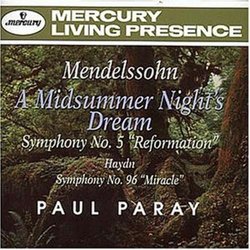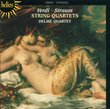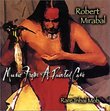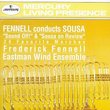| All Artists: Franz Joseph Haydn, Felix [1] Mendelssohn, Paul Paray, Detroit Symphony Orchestra Title: Mendelssohn: Symphony No. 5 / Midsummer Night's Dream Members Wishing: 0 Total Copies: 0 Label: Philips Release Date: 5/12/1998 Genre: Classical Styles: Historical Periods, Classical (c.1770-1830), Modern, 20th, & 21st Century, Symphonies Number of Discs: 1 SwapaCD Credits: 1 UPCs: 028943439626, 028943439626 |
Search - Franz Joseph Haydn, Felix [1] Mendelssohn, Paul Paray :: Mendelssohn: Symphony No. 5 / Midsummer Night's Dream
 | Franz Joseph Haydn, Felix [1] Mendelssohn, Paul Paray Mendelssohn: Symphony No. 5 / Midsummer Night's Dream Genre: Classical A Midsummer Night's Dream is a score that sounds better the faster you play it, generally speaking. Of course, precision must never be sacrificed for speed, and Paul Paray gives us the best of both worlds in a sizzling Ove... more » |
Larger Image |
CD DetailsSynopsis
Amazon.com A Midsummer Night's Dream is a score that sounds better the faster you play it, generally speaking. Of course, precision must never be sacrificed for speed, and Paul Paray gives us the best of both worlds in a sizzling Overture and Scherzo. In fact, all of the music here is played swiftly, elegantly, and with style. Paray was probably the last practitioner of a lost style of French conducting, preferring a lithe, lean sound that ideally complements Mercury's pinpoint recording techniques. This sort of classical poise perfectly suits Haydn as well, so if this combination appeals, then by all means give it a shot. --David Hurwitz Similar CDs
Similarly Requested CDs
|
CD ReviewsI can only concur Rachel Garret | 06/28/2000 (5 out of 5 stars) "Paul Paray was such a phenomenon, it's no wonder he has a worldwide cult following.Nowhere on record is there such an extraordinarily delicate and serene performance of the Midsummer incidental music highlights. Paray approaches this as music for a stage production, not concert music, an approach that paid off in spades for him in his classic L'Arlesienne suites also on Mercury.The tempi are swift, the playing lean, fluent, astonishingly fluid. The combination of amazing orchestral execution and the joy of virtuosity simply transports us into the Shakespearian realm in all its absorbing poetry and light. There has been nothing quite like it before or since and the spell it weaves on us makes us shake our heads in wonder as to how old Paray found all of this. It's nothing short of an artistic revelation. The symphony, not a favorite of mine, is so beautifully proportioned, so well-attended, so dignified and dramatic, that I've always found every other performance of it pretty much a waste of time (even Toscanini). Paray actually makes me think it's Mendelssohn at his best...which it's not.The Haydn was a great Paray specialty: audiences were so enchanted with it at Carnegie Hall, that reviewers reported whistling and courtly dancing in the lobby after concerts. The Detroit Symphony outdoes itself in replicating this scene with its virtuosity and idiomatic presentation, giving old Paray its all, despite a less-than-authentic edition. With interpetative inspiration like this, Haydn can survive any "foul papers."A remarkable reissue that will please everyone for its historic importance and its utter impact as joyous music." Disappointed Santa Fe Listener | 02/07/2003 (1 out of 5 stars) "Having read several Amazon[.com] reviews that told me the Maazel (BPO) recording of the Reformation Symphony that I had and liked was inferior, and that the Paray was simply wonderful, I felt compelled to see what the fuss was about. Boy, was I disappointed. I first have to admit to being unfamiliar with Paray, and I wondered why I hadn't come across more of his recordings. I now know why. His performance of the Reformation was truly boring. It's as if he ignored Mendelssohn's directions. The first movement is totally without fuoco. The andante is at the pace of a cripple's walk. And the finale exhibits a lack of maestoso that would make me question whether Felix's commitment to his religion was strong enough to justify this effort. The entire recording seems thin, and the overall effect is uninspiring, which seems exactly contrary to Mendelssohn's intent. Contrariwise, the Haydn on this recording is rather thick and muddy, being hampered by terrible articulation in the strings. All-in-all a waste of money." Routine performances, screechy sonics Santa Fe Listener | Santa Fe, NM USA | 11/24/2005 (2 out of 5 stars) "Despite the Amazon critic's nonsensical notion that Mendelssohn's Midsummer Night's Dream sounds better the faster you play it, Paray delivers a sprightly account that is the most pleasing thing on this CD. The Reformation Sym. is brusque and foursquare, delivered in screechy, edgy sound--Mercury Living Presence is a lot more variable than its diehard enthusiasts would lead one to believe. The Haydn is a good, middle-of-the-road reading. In all these works the Detroit Sym. Orch. plays well without being in any way a virtuoso ensemble. All in al, this would be a decent three-star collection if the sound were better."
|












